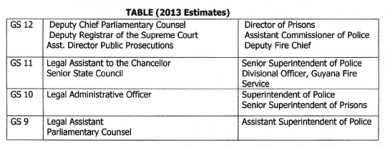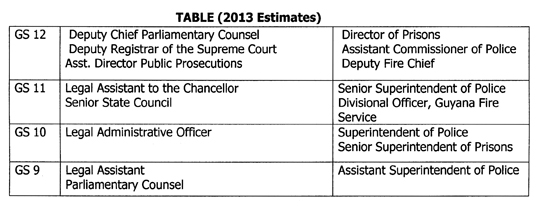Dear Editor,
It must be of interest, particularly to those involved, as well as to other relevant stakeholders, to examine closely the published relative values of posts occupied across the Guyana justice sector. The sector is administered and functionalised largely by professionally trained personnel while there are components which are staffed by comparatively uncertified (either in academic and technical education and training) counterparts. A quick comparison would be between incumbents of posts in the Ministry of Legal Affairs, the Supreme Court, the Magistracy, and the Chambers of Public Prosecution, on the one hand, and their counterparts in the Guyana Police Force, Prison Service and the Fire Service, on the other.
The following table provides a brief summary of comparable posts.
 The gamut of posts, as extracted from the Estimates of the Public Sector 2013, is too large for publication at this stage. But in addition to the foregoing observations the following are also worth noting:
The gamut of posts, as extracted from the Estimates of the Public Sector 2013, is too large for publication at this stage. But in addition to the foregoing observations the following are also worth noting:
Office of the State Solicitor
In the National Estimates of 2012 Programme 4 – Office of the State Solicitor – the following senior post/s were shown as one: Public Trustee, Official Receiver – GS13. This compares with the post of Chief Parliamentary Counsel in the Attorney General Chambers, and those of the Registrar of Deeds, and Principal Magistrate.
Appearing in the 2013 National Estimates are what seem to be two sets of senior posts in this office: (i) Public Trustee, Official Receiver; (ii) State Solicitor, Public Trustee, Official Receiver.
Unless an editorial error was in fact committed, it certainly needs to be explained how in the first instance the two posts at (i) above, became merged into one; then at the same time the same two posts were combined with a third at (ii) above – all in the same GS 13 Grade. (The only ‘technical’ support comes from a Trust Officer at Grade GS 6).
Questions can reasonably be asked about the authority for approving these arrangements. Either the Public Service Commission or the Judicial Service Commission would have been required to be involved. Meanwhile the Public Service Ministry would also have intervened in terms of advising on the value/s of the merged responsibilities, but only after a comprehensive review and re-configuration of the relevant job description/s. Even the selected candidate for this (mega) position must be provided with a full clarification of the objectives, methodologies, and the delivery processes involved, as well as the priorities to be set, so that (i) the individual can fairly self-assess his/her delivery capacity; (ii) decide in turn whether or not the remuneration package is fair enough compensation for the efforts involved, and the outputs expected.
But even when all the above preparatory documentation is completed, the statutory requirement is for the vacancy for the newly aggregated post/s to be advertised, with explicit specifications of the competencies required for measurably effective performance.
Transparency, which is publicly embraced by all stakeholders, would demand that there should be open competition. The above is not so much a critique of the instant administration, but equally a lamentation about those who repetitiously proclaim interest in the welfare of public servants, but display a disturbingly impoverished understanding of the structure, procedures and processes which statutorily attend the operations of the Public Service, and of course the status and actual work environment of those public servants.
Even if the particular multifaceted incumbency (or encumbrance), is an aberration, it clearly cannot be overlooked. In fact it merely adds to the list of other notable transgressions in the employment and compensation management environment of the Public Service.
a) There appears to be another editorial error which shows the post of State Counsel in Legal Affairs graded as GS 10, while that of State Counsel in the Chambers of the Director of Public Prosecutions is graded as GS 09.
b) There are no posts included in the 2013 Estimates of Chief Fire Officer or Chief Magistrate.
Surely all the governance partners are accountable for permitting the deficit in the performance of the Public Service Commission.
This is therefore to urge that immediate corrective action be taken, if only as a starter towards a major reconstruction of the Public Service Commission in particular, and of the Public Service as a whole.
Yours faithfully,
Earl John






